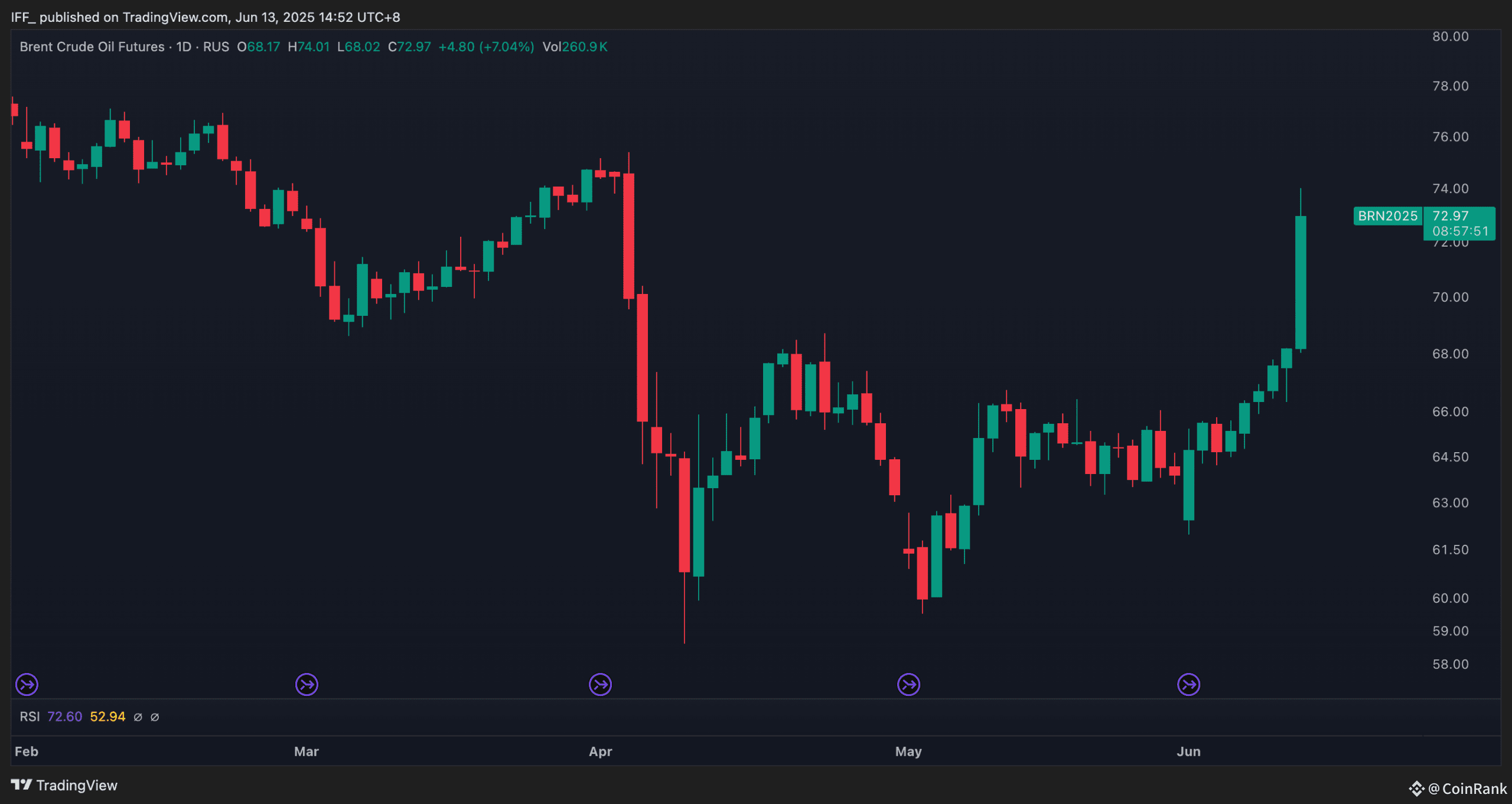Labubu evolved from a PopMart collectible to a global cultural icon, boosted by celebrity endorsements and social media virality.
The $LABUBU meme coin surged 5,934% on Solana, driven by fan loyalty, toy sales, and cultural hype.
Despite its success, $LABUBU faces legal, market saturation, and volatility risks due to its unofficial status and meme coin nature.

On June 13, 2025, a breaking news story swept across the globe: the Israeli Air Force launched precision airstrikes on multiple Iranian targets, triggering sharp turmoil in global financial markets—especially in the cryptocurrency sector, which suffered a significant blow.
Bitcoin dropped 2% within an hour, while Ethereum plunged as much as 4.4%. Other major cryptocurrencies also failed to escape the downturn.
Israeli Defense Minister Katz declared a nationwide state of emergency and warned that Iran may retaliate with missiles or drones. This sudden geopolitical crisis has not only heightened market uncertainty but also presented new challenges for crypto investors.
HOW GEOPOLITICAL CRISES IMPACT CRYPTOCURRENCY
The airstrikes stem from Israel’s long-standing concerns over Iran’s nuclear program. Using a “preemptive” tactic, the Israeli Air Force carried out surgical strikes on Iran’s nuclear facilities and military targets to weaken its nuclear capabilities.
This high-profile military action quickly inflamed tensions across the Middle East.

Iran has yet to issue an official response, but its recent series of military exercises and weapons displays suggest that retaliation may come through direct missile attacks or via its proxy forces—such as Yemen’s Houthi rebels.
While the United States has stated it is not involved in the strikes, it has begun evacuating some diplomats and military families, signaling that it is preparing for a potential escalation.
This complex geopolitical standoff casts a shadow over global markets, with cryptocurrencies—being high-risk assets—bearing the brunt of the impact.
The swift drop in cryptocurrency prices reflects their high sensitivity to sudden events, as market panic quickly spread. Geopolitical crises often drive investors toward traditional safe-haven assets like gold or the U.S. dollar.
Given their high volatility and speculative nature, cryptocurrencies are prone to short-term sell-offs during such periods.

Moreover, the airstrikes drove up crude oil futures, as markets fear potential disruptions to energy supplies from the Middle East. This could further fuel global inflationary pressures, limiting the ability of central banks to maintain loose monetary policies.
A high-interest-rate environment is generally unfavorable for cryptocurrencies, as investors tend to shift toward low-risk, fixed-income assets. Heightened concerns over potential Iranian retaliation reinforce this trend, clouding the short-term outlook for digital assets.
SHORT-TERM VOLATILITY VS. LONG-TERM POTENTIAL IN THE CRYPTO MARKET
Under the current crisis, the short-term performance of the crypto market is likely to remain under pressure. Following the airstrike announcement, market sentiment deteriorated rapidly, and panic selling led to sharp declines in Bitcoin and Ethereum prices.

Source: Coinmarketcap
If Iran retaliates—potentially by attacking Israeli or American military targets in the region—the conflict could escalate into a broader regional crisis. This would further drive up oil prices, disrupt global supply chains, and intensify inflation expectations.
In addition, crypto market liquidity could tighten as investors withdraw funds, further exacerbating price volatility. For those using leverage, such a high-volatility environment significantly increases the risk of liquidation.
However, historical patterns suggest that crypto market downturns triggered by geopolitical crises tend to be short-lived. Following Iran’s attack in April 2024, Bitcoin gradually recovered within a few weeks, demonstrating that the market can absorb short-term shocks.
Over the long term, the trajectory of cryptocurrencies is more influenced by fundamentals and technological developments than by isolated geopolitical events.
Bitcoin’s narrative as “digital gold” may attract some safe-haven capital during crises, especially when traditional financial systems are disrupted by conflict.
Furthermore, ongoing advancements in blockchain technology and increasing institutional participation—such as the growing adoption of crypto ETFs—provide structural support for the market.
Despite the current crisis causing short-term pain, long-term investors might view this correction as an opportunity to reassess entry points.
HOW INVESTORS CAN NAVIGATE UNCERTAINTY
In the face of this geopolitical-induced market turbulence, crypto investors must respond with composure rather than panic. First and foremost, information accuracy is crucial.
Investors should prioritize credible sources for updates—particularly regarding Iran’s response and any potential U.S. involvement, as these will be key to gauging the risk of further escalation.
Second, risk management is essential. Diversifying portfolios—for instance, by holding stablecoins or traditional assets—can help reduce exposure to extreme volatility.
Avoiding excessive leverage is especially important, as sharp market fluctuations can lead to rapid liquidations.
Additionally, maintaining a long-term perspective is critical. While geopolitical crises may cause short-term disruptions, the long-term value of quality crypto assets is typically driven by innovation and demand.
For example, Bitcoin’s halving mechanism and Ethereum’s ecosystem expansion remain key structural supports.
For patient investors, the current downturn may offer a chance to build positions at lower prices—provided decisions are based on thorough research into project fundamentals, rather than chasing short-term rebounds.
Finally, market sentiment swings should be approached with rationality. Social media buzz can amplify both fear and euphoria. Investors should avoid making impulsive decisions based on unverified information and instead rely on sound analysis and strategic discipline.
〈Israeli Airstrikes on Iran Shake the Cryptocurrency Market〉這篇文章最早發佈於《CoinRank》。



